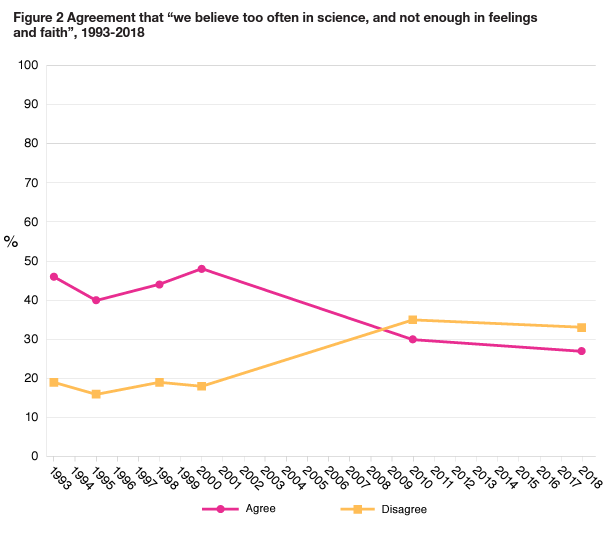
Fancy some good news? A fascinating piece in today’s Guardian outlines the magnitude of the norm shifts that have taken place in the UK after the last 40 years, based on the latest British social attitudes (BSA) survey, which is marking its 40th year of mapping Britain’s cultural and political landscape.
Underneath the left-right pendulum shifts of political debate, the move towards more liberal attitudes is striking: ‘50% of respondents said same-sex relationships were “always wrong” in 1983, compared with 9% in 2022 – and on a woman’s right to choose an abortion, supported by 76% now, against 37% when the question was first asked 40 years ago.’

An important finding for campaigners is that younger people for the first time in 40 years are becoming markedly more leftwing than older people, a development it says may be down to their sense of injustice around inequality and access to housing. You think?
Some caveats and exceptions:
While attitudes towards whether the man or the woman in a heterosexual couple should carry out household chores have changed hugely – 75% regarded ironing as the women’s job 40 years ago, compared with 16% now – the reality lags far behind.
Attitudes towards the role and size of the state have fluctuated, with support for increased tax and spending, for example, swinging from 32% in 1983 to 63% in 1998 before falling to 31% in 2010. It is now back up to 55%.
Attitudes towards transgender people – recorded only since 2016 – appear more volatile, with a recent sharp decline in public support. ‘The proportion of the British public describing themselves as “not prejudiced” towards transgender people fell from 82% to 64% between 2021 and 2022, when the latest survey took place.
Similarly, while 58% of the British public agreed in 2016 that transgender people should be able to have the sex on their birth certificate changed if they wanted, that figure had dropped to 30% by 2022, suggesting “an overall gradual erosion in support towards transgender rights” since 2018.
It’s worth noting that Tory governments have ruled for 27 of those last 40 years, some with explicitly socially conservative policies, yet this seems to have had limited impact on the evolution of liberal public attitudes. The drivers of social liberalism are deeper and more long-term, such as more people going to university, more women going out to work and the decline in marriage and organised religion.
The key findings summary of the BSA survey explores that last point:
‘In 1983, when British Social Attitudes began measuring religious identity, two-thirds of the British public identified as Christian. This figure now stands at just over one third (38%) with 52% of the public saying they do not regard themselves as belonging to any religion.’
That stands in contrast to the growing confidence (belief?) in science and technology, reflected in the answers to this rather convoluted question:

That’s quite surprising, given the rise of ‘lived experience’ narratives that question science (but I guess the anti-vaxxers will just say the survey is part of the conspiracy).
All in all, a useful reminder that the big normative tides continue, to some extent irrespective of formal politics, which should give some comfort to campaigners and activists. And not just in the UK – I assume something similar is happening in many other countries (links please!). It certainly reflects my own life – growing up in 1970s UK was to experience a cesspit of routine and unquestioned homophobia, sexism and racism that is pretty unimaginable today.
Of course, it doesn’t answer the question of how those activists can best push forward the progressive waves, and defend against regressive ones, which seems to be one of the big questions facing us at the moment. But that’s for another post.